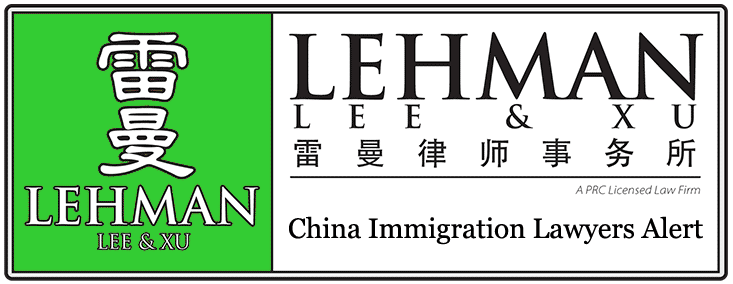
 |
|
LEHMAN, LEE & XU
|
|
China Immigration Lawyers Alert
|
|
September 2011:Online Edition
|
|
|
|
In the News |
Opening salvos fired in battle of right of abode |
Updated: 2011-08-23 07:02 http://www.chinadaily.com.cn/hkedition/2011-08/23/content_13167517.htm
|
Mainland moms press bid for residency right |
Updated: 2011-09-01 06:30 Single mothers from the mainland once again called on the SAR government to allow them to remain in Hong Kong to take care of their children.
|
China Law News |
CONTENTS
_______________________________________________________________________
Singapore Gains as Hong Kong Follows China Rule on ImmunityOn Aug. 26, China approved an interpretation of Hong Kong's Basic Law that states the city should follow central government policy giving countries absolute immunity. Rule stiffens penalties for hackersBEIJING - Hackers who broke into 20 or more computers will face jail terms of up to seven years, according to a new judicial interpretation issued jointly by the China's Supreme People's Court and Supreme People's Procuratorate. People who hack from 20 to 100 computers, or steal from 10 to 50 user names and passwords for online-payment or stock accounts, will get at least three years in prison. And those who hack even more computers or steal more passwords will face jail terms of up to seven years. The latest rule, an interpretation made to deal with online crimes, which were added to the Criminal Law in 2009, also applies to Chinese hackers who steal information from foreign computers, said Zhou Guangquan, a member of the National People's Congress's law committee and a professor in criminal law at Tsinghua University. Continue reading at: http://usa.chinadaily.com.cn/china/2011-08/30/content_13216410.htm China's 12th Five-Year Plan Lays Out Ambitious Blueprint, But Data Challenges RemainIn March, China released its 12th Five-Year Plan a blueprint outlining the key economic and development targets for the country over the next few years. Unlike previous Plans, climate change and energy are featured prominently, and a strong emphasis is placed on a slower, more sustainable growth trajectory. Not only is the 12th Five-Year Plan the first to mention climate change, but it adopts as part of national, binding law the climate pledges China first made at the United Nations Framework Convention on Climate Change (UNFCCCC) Copenhagen climate summit in December 2009. Binding targets for a range of other environment and energy issues are also included in the Plan, including important air and water quality pollutants that were previously absent. Part of the country's ability to achieve these targets will be in its capacity to measure and track progress toward its goals. The Chinese government has pledged implementation of “well-equipped and statistical and monitoring systems” and “index evaluation systems” in the 12th Five Year Plan, indicating an increasing awareness of the importance of data, information and robust infrastructure to ensure targets are met. However, while there are signs of China's move toward a more “data-driven” approach to decision-making in the formulation of the latest Plan, political sensitivities around pollution information still persist, meaning China may still confront challenges when trying to improve environmental conditions. Continue reading at: http://environment.yale.edu/envirocenter/post/ China Trademark Law amendment for publicTo strengthen the administration of trademarks, China's State Council Legislative Affairs Office on the 2nd draft published a draft revised Trademark Law, to seek public views of the community. Court rules iPad news app illegal, levies fineBEIJING - Haidian District People's Court recently ruled that an iPad application for Chinese-language news violates copyrights, levied a 100,000-yuan ($15,600) fine and ordered the developer to withdraw the software.
|
|
|
|
|